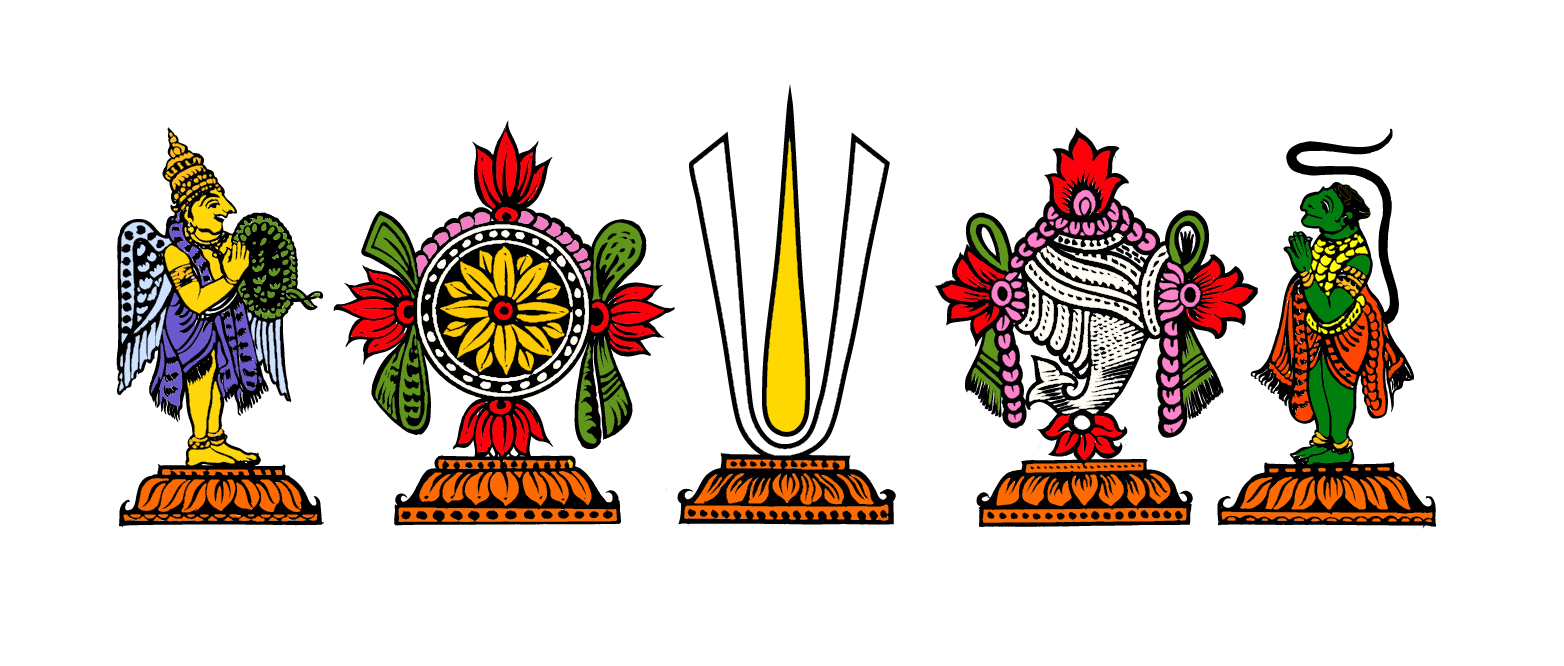Whenever we refer to the supreme Lord Śrīman Nārāyana, we add the prefix ‘Śrī Bhūmi Nīlā Sameta’, showing that He is always with His three Consorts viz Śrīdevī, Bhūdevī and Nīlādevi. The Purusasūkta – Uttara-anuvāka contains the words ‘Hrīśca te Laksmīśca patnyau’ indicating that both Hrih (another name for Bhūdevī) and Laksmī are His Consorts. Bhūdevi’s name also figures immediately after the pranava (Om) in the chant of vyāhri before the Gāyatri Mantra (Śrī Vedānta Deśika’s Bhūstuti 2). According to the Visnupurāna, She is borne on the thousand heads of Ādiśesa. Śrī Deśika refers to it in verse 10 of the Bhūstuti and states that the Lord Himself takes the form of Ādiśesa and holds Her aloft, thus showing His affection for Her.
Bhūdevi is the deity of Earth, one of the five elements (pañca bhūtas) “who is known as Visnu’s Consort and is the chief Goddess of the world” (Bhūstuti 33). She is very intimately connected with all living beings – humans, animals, birds, insects, tree, plants and shrubs. Nay, She provides the sustenance and very basis for their existence. The Earth is karma bhūmi, the ‘arena for action’, where every soul has to take birth before reaching Śrīvaikun‹t¤ha either through the bhakti mārga (devotional path) or prapatti mārga (surrender). In fact, celestials too have to be born in this world, if they want to rise to Heaven.
Mother Earth’s natural beauty has been well brought out by Śrī Deśika: “The forests are Her tresses, the mountains her breasts, the waterfalls are necklaces around Her neck and the wide blue sea Her raiment” (Bhūstuti 23).
Her different names are indicative of Her varied roles in the life of mankind (Refer Bhūstuti 6: avani (Protector of the world), sarvam≈ahā (patient Bearer of human errors), acalā (the steadfast
One), viśvambharā (the Supporter of the universe), vipulā (immeasurable), vasundharā (possessor of wealth), etc. She is also called the sarva-siddhi (fruition of all efforts) in Bhūsuktam. A reference may be made to the narration about Her in Śrī Visnupurāna from where She got the name Prthvī. Prthu was an ideal and righteous emperor, a repository of all noble virtues; he was stated to be an
amśa of Lord Vishnu. He approached the Earth which had gone barren and fallow due to the misrule of his father Vena, and persuaded Her to yield Her bounties to the people so that they may lead prosperous lives. She took the form of a cow, bade Prthu milk Her and get what everyone celestials, men, animals, birds, etc. – wanted. From then on, She came to be known as Prthvī.
She is a profound teacher to those who wish to learn from Her. In the episode of the Ascetic (Śrīmad Bhāgavata XI – Chapters 7 to 9) where Lord Dattātreya lists out the names of twenty-four ‘Masters’ from whom He learnt many things, He cites ‘Earth’ as the first teacher (Chapter 7, verses 37 and 38) who taught him patience and imperturbability.
On the mystic plane also, She evinces great concern for all Her creatures. Immediately after She was rescued by the Lord from the depths of the ocean where She had been hidden by the demon Hiranyāksa, She sought from the Lord ‘an easy way for those who cannot follow the paths of great souls’ (Rahasya Śikhāmani 3 and Amrtāsvādini 20). The Lord graciously acceded to Her request and declared in two verses His clear intentions (Amtāsvādini 21): “Whosoever thinks of Me with devotion when he is conscious and of sound body and mind need not worry about reaching Me. When he is senseless and lies like a log of wood or stone at the doors of death, I shall remember him and take him along the bright arcirādi path to My own abode”.
Further, whenever She feels that Her children (inhabitants of the Earth) are oppressed by evil rulers or forces, She lends Her weight to the prayers of celestials to the supreme Lord to rid the world of such scourges e.g. avatāras of Lord Rāma and Krsna.
When occasion demands, She herself incarnates on the Earth, e.g. as Goda (sāksāt ksamām, Godāstuti1) and composed two most elegant hymns full of poetic beauty and esoteric significance, the Tiruppāvai and the Nācciyar Tirumoli. She ‘begot’ Sītā, the incarnation of Goddess Śrī, another Consort of the Lord, and assisted in the fulfilment of the Lord’s incarnation as Rāma.
To sum up, Mother Earth is the only visible Consort of the three Consorts of the Lord. She, unlike the other two who appear only in the mystic level, can be comprehended by our limited sense organs. She must be respected and kept in profound regard by us. We should ever remain conscious of Her, feel concern for Her, more than we feel even for our own mothers, not ill-treat Her or the innumerable creatures who are indeed Her children, but sustain Her with prayer and constant physical attention. Let us teach our children that Mother earth needs our utmost reverence so that they and their progeny may live in harmony and happiness.


